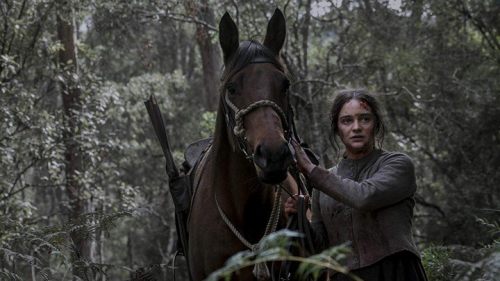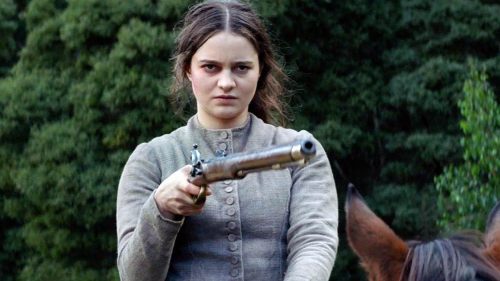Sundance Review: THE NIGHTINGALE Is Punishing, Maybe Too Punishing
I love The Babadook. I love how it’s a simple 90-minute two-hander. I love how it frightens without a body count. I love how it converses with its central metaphor. I came away from my viewings of the film desperate to see what writer-director Jennifer Kent would do next.
Four years later, I finally have my answer and it’s not at all what I expected. Before even getting into the good and bad of the film, it’s important to state up front that Kent’s jump in scope here is both remarkable and impressive. In every way possible (especially running time) this is a much bigger film than her debut.
The Nightingale tells the story of an Irish convict, Clare (Aisling Franciosi), who works in servitude for the horrific Captain Hopkins (Sam Claflin) in a hellish version of 19th century Tasmania in which a life free of rape and murder appears nearly impossible. Clare is a new mother and dreams of winning her and her husband’s freedom, but such freedom relies on the kindness of the monstrous Captain. Instead of granting this wish, Hopkins and his goons visit acts of unspeakable cruelty upon her and her new family, leaving her for dead just before they embark on a grueling trek North across dangerous terrain. Clare has no choice but to hire an aboriginal guide, Billy (Baykali Ganambarr), and follow them on a campaign for revenge.
There are always exceptions but generally revenge pictures require a semblance of balance between the horrors inflicted upon the protagonist and the catharsis from seeing the villains get their due for those wrongs. I admit that’s overly simplistic, but if one of those two elements is out of whack, something’s usually wrong. The horrors inflicted upon Clare are so severe that they essentially blow up any proportional comeuppance. There’s just no payback worth what we’re made to witness here. People should go into this film with a warning about the amount of rape they’re going to see. Even after the inciting incident, we’re not out of the woods yet, as there’s a gratuitous and superfluous female violation subplot halfway through the film as well. It’s a very rough movie.
The Nightingale’s trick, however, is that while it certainly adheres to revenge film tropes in its first half, that’s not what this film is. Instead it slowly evolves away from that into a film focused on race relations between white immigrants (the villains are from England; Clare and her husband are from Ireland) and the aboriginal population, who even Clare talks down to and sees only as guides, barking “boy” at them and calling their rituals “hocus pocus”. Captain Hopkins and his ilk are even worse, often murdering them on sight.
Even in a film this brutal, it should come as no surprise that Clare begins to form a bond with Billy, the real star of this film. First relying on his kindness for her own safety, but then respecting him as an ally, the complications of this relationship are responsible for the film’s extra-long running time whereas the revenge element could have easily been wrapped up in under two hours. But that also would have been less interesting than what The Nightingale actually mutates into.
It’s tricky. For some, that extra running time in service of yet another film where a white person learns to become less racist is going to feel like a tired waste, on top of a film that already asks a lot of viewers in terms of sheer misery. On the other hand, I respect the way Kent sets up a certain type of narrative only to subvert it in ways that look very close to confused filmmaking.
Having said that, I’m still not sure the journey is worth it. I walked out actively angry at the film. I’ve cooled down significantly since then, but I also don’t think you could convince me to ever watch it again. A certain numbness at the horrors on display takes over after a while, and the whole thing begins to feel exploitive and maybe even juvenile in its constant cruelty. And yet there are amazing moments throughout. That last half hour is probably the film’s best.
If nothing else, I’m even more excited to see what Kent does next. This is such a massive left turn away from The Babadook, representing a huge expansion of Kent’s potential talent. The film looks beautiful and features a ton of great performances (though the leads somehow feel too “modern” at times) and definitely can’t be accused of taking it easy. It’s pretty much impossible to guess where Kent will go from here, and while I did have some problems with The Nightingale, it’s definitely impressive enough that I’m still on board for whatever her next project is.



